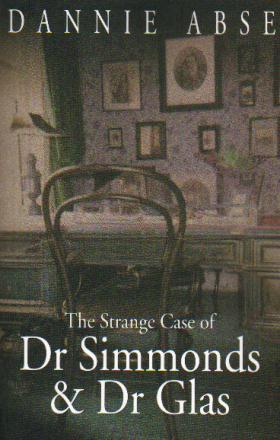
Dannie Abse
This longlist for 2002 does not include the shortlisted novels.

|
The Strange Case of Dr Simmonds & Dr Glas Dannie Abse |
Dustjacket synopsis:
"Take the phial from the medicine cabinet, I thought. Hestitating, haunted, I eventually went down to my surgery
to pick up my leather emergency bag.
"And so Dr Simmonds drove through the night to treat the aging, sick and loathed husband of the dying woman whom he loved.
"Inspired by the disturbing 1905 Swedish classic, Doctor Glas by Hjalmar Söderberg, anovel which questions the possibility of pure moral murder, Dannie Abse draws on his own medical experience as a doctor to create a strange, luminous story of love, infatuation and deceit in 1950s London. The Strange Case of Dr Simmons & Dr Glas was longlisted for the 2002 Booker Prize and shortlisted for the Wingate Prize."
First Paragraph:
Failed at lunch. I had quit Goodge Street station, walked up Charlotte Street to the White Tower full of hope. I left feeling defeated. 'I'm too old,' I thought. 'Duffy is of a different generation.'
I wish now I had not blabbered on complacently about Carl Jung's notorious pre-war judgement, how he had once nauseously suggested that the SS men in Hitler's Germany were being transformed into a noble caste of knights ruling sixty million natives.
I should have put an imperious full-stop to my own over-anxious remarks and tactfully changed the subject when I discerned across the table Patrick Duffy's eyes go dull and humourless. Still, stupidly, I blundered on: 'In 1936 Jung believed there were two types of dictators - the chieftain type and the medicine-man type. He reckoned Hitler belonged to the latter category, the mouthpiece of the old-gods, the Sibyl, the Delphic oracle.'
Patrick Duffy replaced his knife and fork on his plate with some conspicuous deliberation before he replied quietly that Carl Jung had judged Adolf Hitler to be a psychic scarecrow.
From the Robson Books paperback edition, 2003.
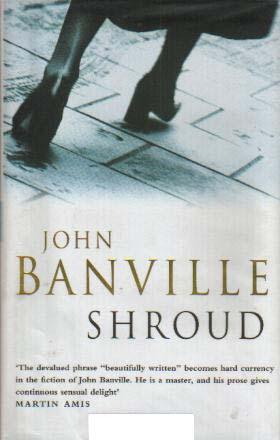
|
Shroud John Banville |
Dustjacket synopsis:
"Axel Vander, celebrated academic and man of culture, is spending his twilight years on the west coast of America, when,
out of the blue, a letter arrives hinting of the secrets he has been hiding for fifty years.
"To find out just how much the writer knows about his past, Vander arranges to meet her in Turin. But he is thrown into emotional turmoil by this encounter with Cass Cleave, a deeply troubled young woman desparate to discover a reason to continue living; and the meeting of the two leads inexorably towards disaster.
"Written in Banville's faultless, almost painfully beautiful prose, Shroud is a novel which is not afraid to ask deep questions, nor to answer them emphatically. It is a richly rewarding work from one of the most accomplished novelists of his generation."
Quotes:
"The devalued phrase 'beautifully written' becomes hard currency in the fiction of John Banville. He is a master, and his
prose gives contnuous sensual delight." - Martin Amis
First Paragraph:
Who speaks? It is her voice, in my head. I fear it will not stop until I stop. It talks to me as I haul myslef along these cobbled streets, telling me things I do not want to hear. Sometimes I answer, protest aloud, demanding to be left in peace. Yesterday in the baker's shop that I frequent on the Via San Tommaso I must have shouted out something, her name, perhaps, for suddenly everyone in the crowded place was looking at me, as they do here, not in alarm or disapproval but simple curiosity. They all know me by now, the baker and the butcher and the fellow at the vegetable stall, and their customers, too, hennaed housewives, mostly, plump as pigeons, with their perfume and ugly jewellery and great, dark, disappointed eyes. I note their remarkably slender legs; they age from the top down, for these are still the legs, suggestively a little bowed, that they must have had in their twenties or even earlier. Clearly I interest them. Perhaps what appeals to them is the suggestion of the commedia dell'arte in my appearance, the one-eyed glare and comically spavined gait, the stick and hat in place of Harlequin's club and mask. They do not seem to mnind if I am mad. But I am not mad, really, only very, very old. I feel I have been alive for aeons. When I look back I see what seems a primordial darkness, scattered with points of cold, hard light, immensely distant, each from each, and from me. Soon, in a few months, we shall enter the final decade of this millenium; I will not live to see the next one, a matter of some regret, the previous two having generated such glories, such delights.
From the Picador hardback edition, 2002.
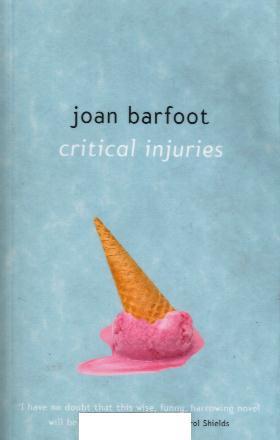
|
Critical Injuries Joan Barfoot |
Dustjacket synopsis:
"Isla is 49, divorced, mother of two grown but troublesome children, co-owner of a successful advertising agency and now
happy wife of Lyle. Roddy is 17, a faltering student and occasional shoplifter, disillusioned with the confines of
small-town life.
"Their worlds collide one hot August afternoon when Isla and Lyle set out to celebrate a minor medical triumph with ice cream from their favourite dairy bar. In the wake of the ill-timed encounter between boy and woman, everything must change. Ahead are losses, challenges and adjustments for both of them, but also a growing awareness of 'ordinary' miracles, second chances and moments of unforeseen grace.
"In this wise novel, laced as always with her sardonic wit and acute observation, Joan Barfoot explores the rich and random nature of human experience."
First Paragraph:
"Hop in," Lyle says, and in Isla hops. He does a little number on her thighs: "tickling the ivory" he calls this. It still delights her to climb into his old dented green pick-up, so large and high, sturdy and workmanlike. Not like the toy sports car he uses for work, or even like her own practical compact, but a serious vehicle designed for serious pursuits.
Although they haven't always been serious in it. Once, they made love in the bed of the truck on a well-used old mattress Lyle was about to take to the dump. "One last time," he said then, from his own Lyleish combination of immediate lust and permanent sentiment. That was a couple of years ago.
This journey is for some other purpose, celebratory and impulsive. Something to do with ice cream? At the far, far end of it, that much trickles back, but there's a problem: a profound interruption after that hopping-in moment; something like an electrical outage.
Isla perceives an absence of memory, and right on its heels an urgent longing for memory, along with a powerful, simultaneous desire not to remember. How odd. She's pretty sure she doesn't ordinarily give much thought to memory, that it doesn't usually loom so consciously large. She notices then the concept of consciousness: that something, anything, might or might not loom large in it. Also that she has, having lost it, regained it. Which has to do with memory, the desirability of it, or the importance.
From the Women's Press paperback edition, 2001.

|
Any Human Heart The Intimate Journals of Logan Mountstuart William Boyd |
Dustjacket synopsis:
"'Every life if both ordinary and extraordinary.' So says Logan Mountstuart, the hero of William Boyd's eighth novel,
Any Human Heart.
"Any Human Heart tells the story of Logan's long and rackety life, which spans every decade of the twentieth century in all its fantastic and humdrum, dangerous and tranquil, tragic and humorous aspect. A novelist who comes to know both great aclaim and astonishing neglect, Logan relates his life through his intimate journals, as he travels from Montevideo, Uruguay, to Oxford in the 1920s, from the Spanish Civil War to global conflict in unlikely war-zones as the Bahamas and Switzerland. The post-war years see Logan living and loving in New York, West Africa, London and France, meeting all manner of idiosyncratic characters: his three wives, his family, friends, enemies, rivals and lovers. Virginia Woolf, the Duke and Duchess of Windsor, Ernest Hemingway, Ian Fleming and the Baader-Meinhof Gang are some of the notables who form his eclectic circle.
"Any Human Heart is a long, ambitious, all-encompassing novel, charting all the comedy and tragedy, the weirdness and vulgarity, the melancholy and absurdity of existence. A book about the beguiling and baffling mystery of individual lives, it is - in the end - an expansive exploration of what it means to call yourself human."
First Paragraph:
'Yo, Logon,' I wrote. 'Yo, Logan Mountstuart, vivo en la Villa Flores, Avendia de Brasil, Montevideo, Uruguay, America del Sur, El Mundo, El Sistema Solar, El Universo.' These were the first words I wrote - or to be more precise, this is the earliest record of my writing and the beginning of my writing life - words that were inscribed on the flyleaf of an indigo pocket diary for the year 1912 (which I still possess and whose pages are otherwise void). I was six years old. It intrigues me now to reflect that my first written words were in a language not my own. My lost fluency in Spanish is probably my greatest regret about my otherwise perfectly happy childhood. The serviceable, error-dotted, grammaticallt unsophisticated Spanish that I speak today is the poorest of poor cousins to that instinctive colloquial jabber that spilled out of me for the first nine years of my life. Curious how these early linguistic abilities are so fragile, how unthinkingly and easily the brain lets them go. I was a bilingual child in the true sense, namely that the Spanish I spoke was indistinguishable from that of a Uruguayan.
From the Hamish Hamilton paperback edition, 2002.
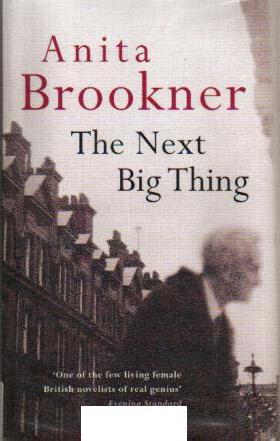
|
The Next Big Thing Anita Brookner |
Dustjacket synopsis:
"Herz wondered if the people he passed on the street ruminated on lost causes, as he did. Try as he might to divert
himself, he could never escape the suspicion that he should be elsewhere.
"Herz is seventy-three and facing the difficult question: what is he going to do with the rest of his life? How is it all going to end?
"He could propose marriage to an old friend he hasn't seen in thirty years; he could travel; he could make a trip to Paris to see a favourite painting; he could sell his flat, move, start afresh. He must do something with the time left - but what?
"In her cleverest, funniest book to date, Anita Brookner brilliantly captures all the tremulous anxieties of old age - the misunderstanding of an increasingly modern, alien world, the bungled conversations with passers-by, the letters written, torn up and rewritten - and the bizarre and magnificent self-knowledge that only age and experience bring."
First Paragraph:
Herz had a dream which, when he awoke into a night that was still black, left him excited and impressed. He dreamed that he had receved a call from his cousin, Fanny Bauer, the love of his life. He was to take her to the cinema, she ordained. Eager to conform to her wishes, as he always had been, he shrugged on his coat, and within seconds was elsewhere, as was the norm in dreams of wish-fulfilment. Although it was a weekday afternoon the cinema was so crowded that they had to stand at the back of the auditorium. Fanny was as he had always known her and still remembered her: petulant, with a petulance of a spoilt pretty woman, demanding and discontented. Shortly after the beginning of the film she had clutched his arm and declared that she felt unwell. Again, without transition, they found themselves in the vast café that was part of the cinema complex. Fanny had recovered somewhat but looked uncharacteristically dishevelled, with a large camel-hair coat slung over her shoulders. He was conscious of retaining his eager smile, but felt discomfited. This feeling had something to do with the coat, which he recognized as his own, the coat he should have been wearing. He had no memory of having offered it to her. The coat, and Fanny's malaise, remained closely associated in his mind. It was only when he understood that it was he who had been taken ill that the dream attained its peak of significance. Ailing, smiling, he had offered her his remaiing health and strength, and she, not in the least grateful, had carelessly dispossessed him, not noticing that she had done so. This was so akin to their real life association that, if anything, his newly-awakened self was conscious of its reality. Brought back to himself he was aware of the smile - of complicity, of acquiescence - directed to the corners of the dark bedroom. Only the relentless ticking of his clock informed him that he had woken up, that this would soon be a new day, all too closely resembling the others, the normal days of his present existence, in which nothing happened nor could be expected to happen.
From the Viking hardback edition, 2002.
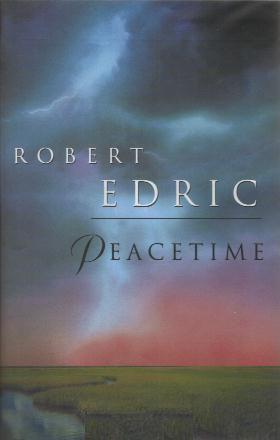
|
Peacetime Robert Edric |
Dustjacket synopsis:
"Late summer 1946: the Wash on the Fenland coast. Into a suspicious and isolated community comes James Mercer, until
recently a serving captain in the Engineers and now employed in the demolition of redundant gun platforms. A relationship
grows between Mercer and the wife and daughter of a soldier who is soon expected home - though he is returneing not from
active service but from a sentence in military gaol, and his arrival is awaited with anxiety.
"Mercer also befriends Mathias, a German prisoner of was engaged in similar work who has no wish to be repatriated; and Jacob, a Jew, former glassmaker and camp survivor, of whose devastating journey to this isolated place Mercer gradually learns. He learns, too, of the bond between the German and the Jew, and is drawn further into their history as the ex-soldier finally returns and begins to re-establish his overbearing authority.
"In a place where nothing has changed for decades, the agents of destruction and renewal are at work and everyone begins to search for his or her piece of solid ground. As the summer dies, animosities flare, prejudices and enmities are burnished and the six main characters circle each other like the combatants they believe themselves to be - each man or woman constrained by an intractable moral code, the loss of which is unthinkable. And Mercer finds himself caught in the centre as events quicken to their violent and unexpected conclusion.
"In his powerful new novel, Edric captures with breathtaking economy the sense of portent and uncertainty shared by a community in the aftermath of conflict - a community for which peacetime is hardly any different to wartime."
First Paragraph:
The girl came slowly towards him, and James Mercer watched her through his binoculars, convinced that he could not be seen by her. He adjusted his lenses and brought her more sharply into focus, his elbows sinking deeper into the fine sand which was already beneath his shirt and in his boots.
It had not been his intention to spy on her. He had been watching for the lorries carrying the labourers, already an hour late, when she had come unexpectedly into view. In the week since his arrival, this was only the second time he had seen her. She walked with no apparent purpose or destination, frequently pausing to look around her. And watching her, even at that distance, Mercer sensed that she gained some small pleasure from being so alone and so aimless. The road was narrow and badly worn, and led only to the houses and abandoned buildings at its end.
The sun was high, and in the opposite direction the line of the road was molten in the haze, its boundaries lost to the drifting sand which came and went from its margins.
The dunes in which Mercer lay provided the only natural vantage point for miles in any direction, and he had gone there to watch for the approaching vehicles so that he might be ready for the men upon their arrival. They were an unwilling workforee and delayed each day's start for as long as possible. It was his intention that particular morning to watch for them coming and then to start up the generators before they arrived, filling the still air with their pall of blue smoke, and hopefully suggesting some degree of urgency about the work ahead.
From the Doubleday hardback edition, 2001.

|
Spies Michael Frayn |
Dustjacket synopsis:
"In the quiet cul-de-sac where Keith and Stephen live the only immediate signs of the Second World War are the blackout
at night and a single random bomb-site. But the two boys suspect that the comfortably ordinary houses in the Close and
their inhabitants are not what they seem. As Keith, the leader in all their enterprises, authoratively informs the
trusting Stephen, the whole district is riddled with secret passages and underground laboratories - hideaways for any
number of murderers, unsung war heroes and secret agents.
"Then one day Keith announces an even more disconcerting discovery: the Germans have infiltrated his own family. And when the secret undergound world they have dreamed up emerges from the shadows they find themselves engulfed in mysteries far deeper and more painful than they had bargained for.
"In this beautiful new novel Michael Frayn evokes a time and characters which are as vivid as if they had appeared before us today, confirming his reputation as one of our most outstanding contemporary novelists.
"Michael Frayn's nine previous novels include Towards the End of the Morning, The Trick of It and A Landing on the Sun. His most recent, Headlong was shortlisted for the 1999 Booker prize, Whitbread Novel Prize and the James Tait Black Memorial Prize for Fiction. His thirteen plays range from Noises Off to Copenhagen, and he has translated a number of works, mostly from the Russian. His is married to the biographer and critic Claire Tomalin."
First Paragraph:
The third week of June, and there it is again: the same almost embarrassingly familiar breath of sweetness that comes every year about this time. I catch it on the warm evening air as I walk past the well-ordered gardens in my quiet street, and for a moment I'm a child again and everything's before me - all the frightening, half-understood promise of life.
It must come from one of the gardens. Which one? I can never trace it. And what is it? It's not like the heartbreaking, tender sweetness of the lime blossom, for which this city's known, or the serene summer happiness of the honeysuckle. It's something quite harsh and coarse. It reeks. It has a kind of sexual urgency to it. And it unsettles me, as it always does. I feel ... what? A restlessness. A longing to be over the woods at the end of the street and away, away. And yet at the same time I have a kind of homesickness for where I am. Is that possible? I have a feeling that something, somewhere, has been left unresolved, that some secret thing in the air around me is still waiting to be discovered.
Another hint of it as the summer breeze stirs, and I know that the place I should like to be off to is my childhood. Perhaps the home I'm homesick for is still there, after all. I can't help noticing, as I do every summer in late June, when that sweet reek comes, that there are cheap flights to that far-off nearby land. Twice I pick up the phone to book; twice I put it down again. You can't go back, everyone knows that ... So I'm never going, then? Is that what I'm deciding? I'm getting old. Who knows, this year may be the last chance I'll get ...
From the faber and faber paperback edition, 2002.

|
Still Here Linda Grant |
Dustjacket synopsis:
"The place is Liverpool, a dying port facing the Atlantic, once the embarkation point for nine million future Americans.
"Alix Rebick, tough, arrogant, angry, is a survivor of the sexual revolution, but at forty-nine she believes that she is fated to spend the rest of her life alone. Returning from exile in France to the bedside of her dying mother, Alix with her brother Sam receive a final message - forcing her to uncover the family secrets that lie in pre-war Dresden.
"Joseph Shields, an American architect of Liverpool's restoration, is in a war - with the city's underworld, with his wife back in Chicago who has left him, and with his own memories of his time as a combat soldier. What he is not interested is an affair with the woman who unlocks the city's secrets for him and who is consumed by erotic desire for the American stranger.
"As they struggle to come to terms with the flawed truths of their own middle-aged lives, each is forced to confront the consequences of the choices they made long ago.
"From the Orange prize-winning author, Still Here is an exhilarating story of lust, cities, war and emigration."
First Paragraph:
From the river the city seemed like a colossus. The sky was heavy with the rain and the wind was sharp. Salt and tar were in our throats, our eyes were stinging. Seabirds were screaming in the sky and the ships' horns boomed along the estuary; behind us was the emptiness of the sea. The pilot boat went out and came back in, guiding the ships through the invisible channels in the sand and silt. Lashed to them by metal cables, the tugs hauled the leviathans into port. The city bore down on the shore, the dock brought the water into land and closed in on it four-square. Everything was immense: the warehouses, the habour board, the shipping lines, the insurance firms, our two cathedrals, all made the skyline and beyond them our magnificent temple of Zion. The city spoke in tongues and when it didn't speak it shouted.
From the Little, Brown hardback edition, 2002.
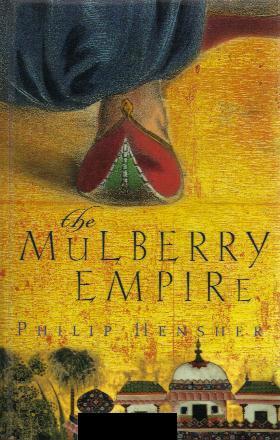
|
The Mulberry Empire Philip Hensher |
Dustjacket synopsis:
"A stranger was there, out there somewhere, in the haphazard overlapping streets of Kabul. Down there, somewhere in
the carpet-mass of pattern and direction, a European stranger had arrived, disguised, and the town was talking and
talking about the new arrival until the muted babble of discussion mounted the hill to the imperial palace and reached
the ears of the Amir. And to the Amir, the arrival of the new European was like the dropping of a rock into an opaque
pool of water, ruffling the surface immediately, disturbing its depths in ways which could not be seen or understood."
First Paragraph:
The Amire Dost Mohammed Khan had fifty-four sons. And his favourite among these sons was Akbar. One day Dost Mohammed feared that he was ill, and close to dying, and he called fifty-four sons to him. They came from the far peaceful corners of the kingdom of the Amir Dost Mohammed Khan to the great city he had caused to be built, and as they rode through the country, they were not troubled or threatened. The wisdom and strength of their father made straight roads for them, and the justice he had wrought smoothed their passage.
One after another, his four-and-a-half dozen sons came to the great city of Kabul, and the people of Kabul, seeing that the Amir Dost Mohammed Khan had summoned his sons, turned their dust-filled eyes to the dust in grief. One after another, his sons rode through the wide streets, which were crowded but silent in sorrow. They came to the great palace, and came to the bedchamber of their father, the Amir Dost Mohammed Khan. And to each he said with kindness, as he came in, that his speed had been that of one driven by the Wind of a Hundred and Twenty Days. But the great Amir lied, for each had been driven to him by love.
At the end of three days, the Amir Dost Mohammed Khan lay in his bed, and looked around at the silent crowd of his sons, and bid them count themselves. The living counted themselves, and then the dead sons, and then the sons to come, who were not yet born, whom Dost Mohammed loved best, said their names, but only to Dost Mohammed in the dark shade raised over his head. He counted them, and there were fifty-three. It seemed to Dost Mohammed that one was missing.
From the Flamingo paperback edition, 2002.
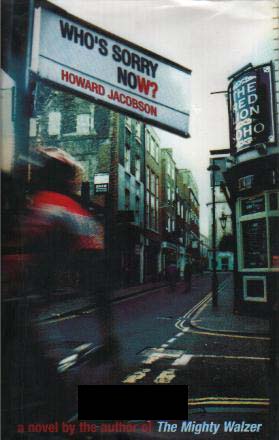
|
Who's Sorry Now? Howard Jacobson |
Dustjacket synopsis:
"Marvin Kreitman, the luggage baron of South London, lives for sex. Or at least he lives for women. At present he loves
four women - his mother, his wife Hazel,and his two daughters - and is in love with five more, his wife's
interior decorator and his ex-window-dresser's mother among them. Charlie Merriweather, on the other hand, nice
Charlie, loves just the one woman, also called Charlie, the wife with whom he has been writing children's books and
having nice sex for twenty years.
"Once a week the two friends meet for a Chinese lunch in Soho, contriving never quite to have the conversation they would like to have. The conversation about fidelity and womanising, and which makes you happier.
"Until today, that is. And now they have started that conversation there is no stopping it. It is Charlie who takes the dangerous step of asking for a piece of Marvin's disordered life, but what follows embroils them all, the wives no less than the husbands. And none of them - nice or not-nice - will ever be the same again.
"No one writes better than Howard Jacobson about the sexual battlefield, its comedies and its tragedies, and in Who's Sorry Now? he is in majestic form - unnervingly truthful, poignant, and very, very funny."
First Paragraph:
You can learn a lot about a man from the sorts of bedtime stories he tells his children. Marvin Kreitman, archivist of himself, put his daughters to sleep - when he was at home - with reminiscences so painful to him, they might have been designed to hurry the girls out of childhood altogether.
Every Thursday, Friday, Saturday night, come wind, come rain, small squishy-hearted Marvin Kreitman - that's me - watched his father, the Purse King - that's your grandfather - shake from his leather apron, like rats from a rat-catcher's sack, the takings from his market stall. Spellbound, he watched the crumpled notes creak like sand crabs in a huddle, slowly open, move sideways and come apart. Every Thursday, Friday, Saturday night the same. And every Thursday, Friday, Saturday night, small squishy-hearted Marvin Kreitman was excluded from the count.
From the Jonathan Cape hardback edition, 2002.

|
If Nobody Speaks of Remarkable Things Jon McGregor |
Dustjacket synopsis:
"A quiet Sunday afternoon, the last day of summer. In his room at No 18, a nervous young man is storing his things: a
small clay figure, covert photographs of his neighbours, pieces of urban junk. Two doors down, a blonde girl is packing
her possessions, uncertain of where she's going next. Across the road, a mother and father are sneaking
away to their bedroom and locking the door; a houseful of young people are re-emerging from their night before; a man is
painting the window-frames of his house. There is cricket, a barbecue, music, voices drifting from open
windows - it had seemed such an ordinary afternoon on an ordinary street.
"But this is an extraordinary day, like any other. A day crammed full of the unspoken, of love stories, unacknowledged grievances, unwitnessed triumphs, and, as the day falls to a close, a terrible moment of tragedy.
"Later, the blonde girl will remember this day again and again; and when a chance meeting causes her to look through the young man's box of personal archives, she will wonder at the photographs of all these people she knew nothing about. And she will ask herself how she never noticed that the boy from No 18 was in love with her.
"With heart-stopping clarity, the lives of a city street are brought indelibly before the reader, taking on focus like Polaroids on the page. Rarely does a new writer appear with so much music and poetry - so much vision - that, in his words, he can make the world seem new."
First Paragraph:
If you listen, you can hear it.
The city, it sings.
If you stand quietly, at the foot of a garden, in the middle of a street, on the roof of a house.
It's clearest at night, when the sound cuts more sharply across the surface of things, when the song reaches out to a place inside you.
It's a wordless song, for the most, but it's a song all the same, and nobody hearing it could doubt what it sings.
And the song sings the loudest when you pick out each note.
The low soothing hum of air-conditioners, fanning out the heat and the smells of shops and cafes and offices across the city, winding up and winding down, long breaths layered upon each other, a lullaby hum for tired streets.
The rush of traffic still cutting across flyovers, even in the dark hours a constant crush of sound, tyres rolling across tarmac and engines rumbling, loose drains and manhole covers clack-clacking like cast-iron castanets.
Road-menders mending, choosing the hours of least interruption, rupturing the cold night air with drills and jack-hammers and pneumatic pumps, hard-sweating beneath the fizzing hiss of floodlights, shouting to each other like drummers in rock bands calling out rhythms, pasting new skin on the veins of the city.
From the Bloomsbury hardback edition, 2002.
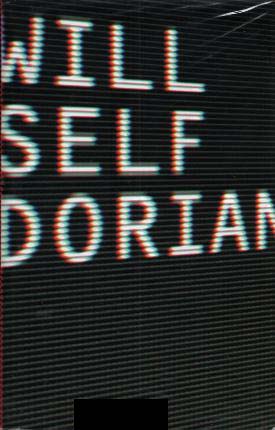
|
Dorian Will Self |
Dustjacket synopsis:
"It's the summer of 1981 and 'the Royal Broodmare' - as Henry Wotton has dubbed her - is about to be married to the Prince
of Wales, while Brixton is in flames. Wotton, uneasily gay, egregiously drug-addicted and queasily snobbish, is at the
centre of a Chelsea clique dedicated to timeless dissolution. His friend Baz Hallward, a some-time Warhol acolyte and
video installaton artist, has discovered a most remarkable young man, the very epitome of male beauty, Dorian Gray.
Hallward's installation Cathode Narcissus captures all of Dorian's allure, but perhaps it's captured another more
integral part of him as well?
"Certainly, after a night of debauchery that climaxes in a vertitable conga line of buggery, Wotton and Hallward have been snared by a sinister retrovirus which becomes synonymous with the decade.
"Sixteen years later the Broodmare's shattered body lies dying in a Parisian underpass, but what of Wotton and Hallward? How did they fare as the stock market soared and their T-cell counts plummeted? And what of Dorian, a sultan of style in an era of mass superficiality? How is it that he remains so healthy and youthful while all around him sicken and age and die?
"Set against the Aids epidemic of the 1980s and '90s, Will Self's Dorian is a shameless reworking of our most significant myth of shamelessness."
First Paragraph:
Once you were inside the Chelsea home of Henry and Victoria Wotton it was impossible to tell whether it was day or night-time. Not only was there this crucial ambiguity, but the seasons and even the years became indeterminate. Was it this century or that one? Was she wearing this skirt or that suit? Did he take that drug or this drink? Was his preference for that cunt or this arsehole?
These combinations of styles, modes, thoughts and orifices were played out in the gloom of the Wottons' dusty apartments and the brightness of their smeary water-closets, as if artefacts, ideas, even souls were all but symbols inscribed upon the reels of the slot machine of Life. Yank the arm and up they came: three daggers, three bananas, three pound signs. At the Wottons', three of anything paid out generously - in the coin of Misfortune.
But such was the particular correspondence between the year our story begins, 1981, and the year of the house's construction, 1881, and such was the peculiarly similar character of the times - a Government at once regressive and progressive, a monarchy mired in its own immemorial succession crisis, an economic recession both sharp and bitter - that a disinterested viewer could have been forgiven for seeing more enduring significance in the fanlight and the dado, the striped wallpaper and the gilt-framed mirror, a reproduction bust of Antinous and a very watery Turner, than in the human figures that actually stood in the mote-heavy beam of light which fell to the runner.
From the Viking hardback edition, 2002.
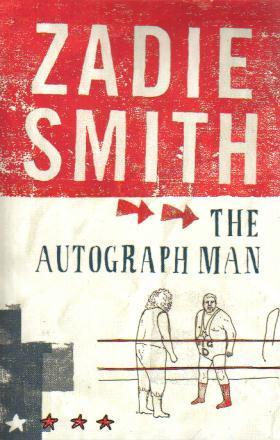
|
Autograph Man Zadie Smith |
Dustjacket synopsis:
"We live in a world of signs. But not everybody has to trade in them...
"Alex-Li Tandem sells autographs - a small blip in a huge worldwide network of desire. It is his business to hunt for names on paper, collect them, sell them, occasionally fake them, abd all to give the people what they want: a little piece of Fame. But what does Alex want? Only the return of his father, the reinstatement of some kind of all-powerful benevolent God-type-figure, the end of religion, something for his headache, three different girls, infinite grace and the rare autograph of forties movie actress Kitty Alexander. With fries.
"The Autograph Man is a deeply funny, existential tour around the hollow things of modernity - celebrity, cinema and the ugly triumph of symbol over experience. Through London and then New York, Alex is sent on a paper-trail, searching for the only autograph that ever mattered to him, resisting the mystical lure of Kabbalah and Zen, and avoiding all collectors, conmen and interfering rabbis who would put themselves in his path. Pushing against the tide of his generation, Alex-Li is on his way to finding enlightenment, otherwise known as some part of himself that cannot be signed, celebrated or sold ..."
Quotes:
"Smith demonstrates both an instinctive storytelling talent and a fully fashioned voice that's street-smart and learned,
sassy and philosophical all at the same time. A writer of remarkable powers" - The New York Times
First Paragraph:
He has the ability to imagine himself a minor incident in the lives of others. It is not an abstract thing. Alex-Li Tandem would not know quite what you meant by 'abstract' - he is twelve. He simply knows that if he imagines swimming in the sea, well, while most children will think immediately of the cinematic shark below them, Alex, in his mind, is with the lifeguard. He can see himself as that smudge on the horizon, his head mistaken for a bobbing buoy, his wild arms hidden by the roll of the surf. He can see the lifeguard, a bronzed and languid American, standing on the sand with his arms folded, deciding there's nothing out there. Alex sees the lifeguard wander off down the beach in search of those half-bare German girls from yesterday and a cold drink. The lifeguard buys a Coke from a passing vendor. The shark severs Alex's right calf from his body. The lifeguard sidles up to Tanya, the pretty one. The shark drags Alex in a bloody semicircle through the water. The lifeguard speaks kindly to her ugly friend with the flat chest, hoping for brownie points. Some vertebrae snap. Did you see that? A seal! says Tanya, mistaking Alex's desperate hand for the turn of a glossy flipper. And then he's gone. Is it a bird? Is it a plane? Is it a seal? No, it's me, drowning. This is how things go for Alex-Li. He deals in a shorthand of experience. The TV version. He is one of this generation who watch themselves.
From the Hamish Hamilton paperback edition, 2002.
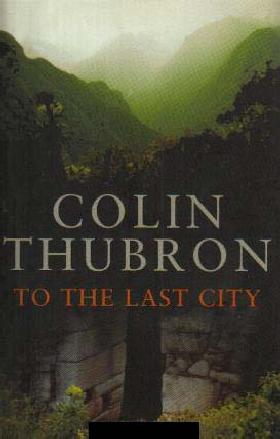
|
To the Last City Colin Thubron |
Dustjacket synopsis:
"In this brilliant book, Colin Thubron for the first time joins his talents as a travel writer with his gifts as a
novelist. To the Last City is set deep in the Peruvian Andes, where five ill-prepared travellers - men and women
with different values, temperaments and motives - find themselves trekking through one of the most exacting and
beautiful regions on earth.
"It is a journey which may temper or destroy them. They confront not only their relationships with one another, but the enigmas of the country's past, the dangers of its present, and the limitations of their own minds and bodies. The 'lost city' of their destination in Vilcabamba, last refuge of the Inca against the Spaniards, subsumed by jungle for four hundred years.
"The power of Colin Thubron's imagination and the beauty of his descriptive prose combine to make To the Last City a novel which can be read on several levels."
First Paragraph:
As they descended towards the ravine, the mountains rose to meet them. They were entering a solitude deeper than any they had imagined. They felt themselves dropping out of the light. The cloud forest thinned, and gusts of warm air blew up from below. Their horses' hooves sent stones whistling into the chasm. Above them, the palisade of snow-peaks - the destination they could not imagine - was slung across half the sky.
All afternoon, along a barely traceable path, they corkscrewed five thousand feet down the ravine. The sun shone gently on them - it was Peru's winter - and there was no wind. Beneath them, the Apurimac river, depleted by the dry summer, still surged over its boulders. Ahead of them, as they dropped deeper - some on foot, some on horseback - the peaks of Vilcabamba were at last obliterated by the valley wall, which was split by vertiginous spurs and clefts.
The Belgian's thighs ached under the short, descending steps of his horse, and the Englishman's feet, by the fourth hour of walking, had worked loose and inflamed in their boots. But for the moment he was too engrossed to care, while in front of him the delicate priest went with an expression of exalted reverie which the others found ridiculous, but imagined they understood. Here and there a tense glitter of streams ran in the defiles, and whenever they crossed one they entered a tangle of wild fuchsias and trees clotted with moss and bromeliads.
From the Chatto & Windus hardback edition, 2002.
This page and its contents are copyright © 2004-05 by Perry Middlemiss, Melbourne, Victoria, Australia.
Last modified: October 15, 2005.